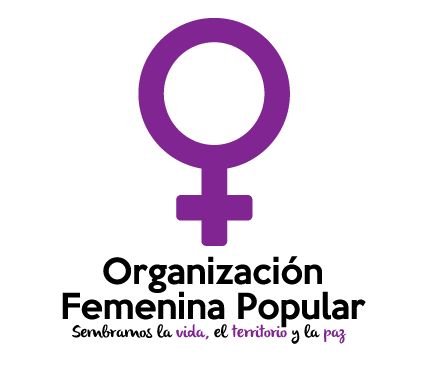The women of Magdalena Medio dusted off their black dresses that symbolize mourning and raised their voices once again in defense of life. They did so in the context of the report presented by the
Office of the Ombudsperson (Defensoría del Pueblo) on the Human Rights of Women and the LGTB+ population, in Barrancabermeja, Santander.
Women leaders filled up the room, as they listened to the report drafted by the Office of the Ombudsperson with input from Organización Femenina Popular (OFP) and 40 other civil society organizations and entities in the region.
The 92-page document spells out the harsh realities caused by the subjugation of women, including machismo and dynamics such as armed conflict, the economy, institutional discrimination, the defense of the environment and gender-based and domestic violence. It also addresses violence against the LGBT+ population.
The Human Rights Report
According to the Office of the Ombudsperson, the feminization of poverty denies access to basic services and to the work towards the restitution of rights, leading to other situations of risk. For example, “Organized crime and armed entities use women heads of households and victims of displacement.” It is also significant that six women experienced death threats from the Gaitanista
Self-Defense Groups in Barrancabermeja in February of 2023, as the group deemed the women to be informants (campaneras) for another gang of traffickers.
The report indicates that armed groups continue to threaten women leaders and defenders of the environment and human rights in the context of territorial disputes, that “communities are confined and rules of conduct are imposed, and bodies are being controlled,” as seen, according to the OFP, in areas of Barrancabermeja, San Pablo and Puerto Wilches and in Micoahumado, a
rural area in Morales.
Indicators for domestic violence are telling. The Office of the Ombudsperson reports that 108 cases of gender violence were addressed in the region in 2022… 58% from the municipality of Barrancabermeja, Santander; 13% in Puerto Boyaca… 11% in Aguachica… and 8% in San Pablo…”
It also indicates that, “with regards to members of the LGTB+ community, the Office addresses a monthly average of 13 cases related to violence due to prejudice in the context of the armed conflict. In the first quarter, there were already 31 acts of violence reported…”
On the persecution of women leaders “So far in 2023, the Office has learned of 11 cases of women social leaders threatened through leaflets; one LGTBI leader harassed and five women killed.”
It is thus that the region has been deemed to be a humanitarian crisis. Yolanda Becerra, spokeswoman for the OFP, stated that beyond the recommendations and monitoring from the report, “it merited the attendance of senior officials of the national and departmental government, with decision-making power.”
The event was attended by National Ombudsperson Carlos Camarco, Presidential Adviser for the Equity of Women, Clemencia Carabali Rodallega, Executive Administrative Department’s Adviser for National Reconciliation, Eva Ferrer, senators Gloria Florez, Jahel Quiroga, Ana Maria Castaneda, and Robert Daza, congresswoman Dorina Hernandez, hosting mayor Alfonso Eljach, as well as representatives from the Attorney General’s Office, the Office of the Prosecutor General, and the government of Santander.
From Presentation to Congress
Historical Pact senator Gloria Florez, one of the “sponsors” of the event, announced that she will summon the corresponding authorities mentioned in the recommendations of the report to a session in the Senate, so that “they can face the women of
Magdalena Medio.”
For her part, Yolanda Becerra said that “this event is part of a process and that is why we will continue as long as necessary so that we are not only heard, but decisions are made to protect the lives of women and communities.
During the presentation, there were two moments that symbolized the 50 years of work of Organización Femenina Popular and the resistance of Medio Magdalena non-profits: the black dresses that were used as a sign of mourning at the height of the armed conflict and the yellow flowers that represent hope.



